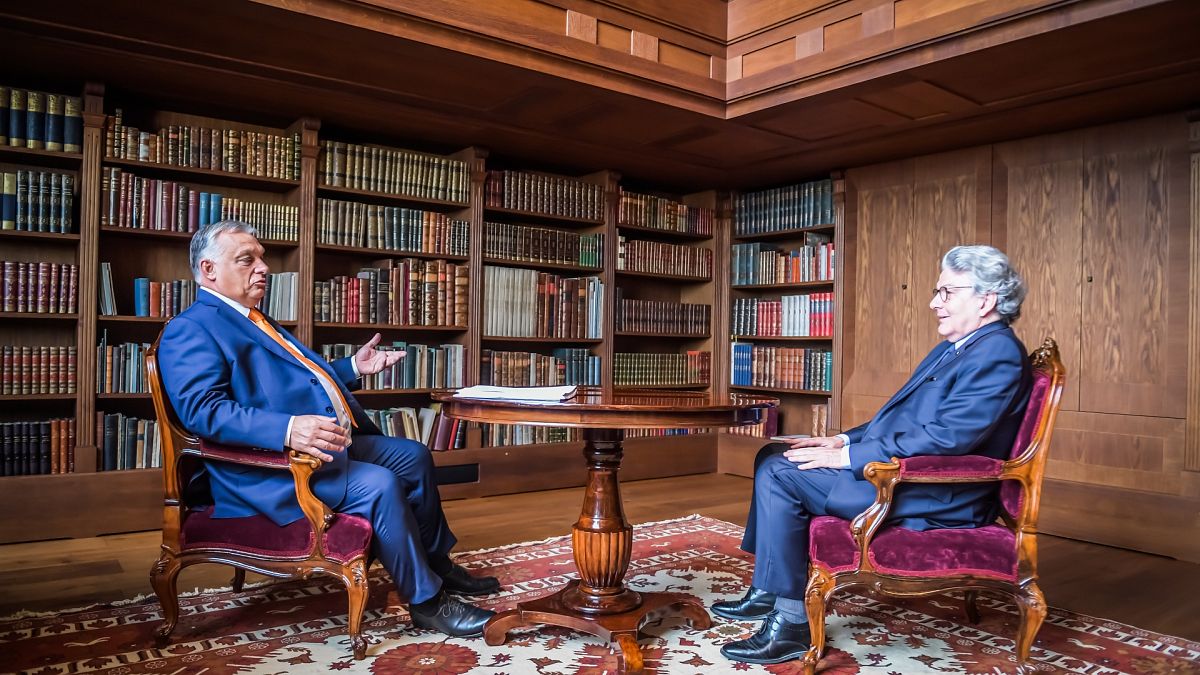Elon Musk has taken the side of an MEP allied to Hungarian leader Viktor Orbán in a dispute over alleged electoral censorship by Brussels. Euronews looks at the details.
Hungarian MEP András László has hit out at what he sees as double standards from Brussels over foreign interference.
For years, Fidesz, the ruling party to which László belongs, has complained about overseas actors — from Hungarian-American philanthropist George Soros to the US government — meddling in domestic politics.
Fidesz leader Viktor Orbán has also been accused of limiting media and academic freedom as he attempts to maintain his nearly 15-year grip on power.
László claims that the European Commission is adopting a different approach to interference from US-based billionaire Elon Musk, who’s used his influential X platform to call for Germans to vote for the far-right Alternative for Germany in upcoming elections.
“Liberal elites want to cancel democracy,” when elections don’t go the right way, László said in a post on X, adding: “We need to defend our democracies and our sovereignty.”
His post was immediately endorsed by Musk himself, who bought the social media platform, then known as Twitter, in 2022.
Euronews takes a deeper look at some of László’s claims.
This a reference to the US government’s Independent Media Support Fund, which, according to the embassy, aids independent Hungary media outlets, in the light of concerns that Orbán clamped down on dissenting voices.
It’s part of a Congress-backed programme to support democratic institutions and civil society in Europe and elsewhere, and the US government says recipients can’t be affiliated to any political party.
Washington isn’t the only player that’s expressed concerns about the lack of diversity in Hungary. The non-governmental organisation Reporters Without Borders has described Orbán as a “predator of press freedom” who “built a true media empire subject to his party’s orders.”
Those worries also seem shared by the European Commission, which in a July 2024 report cited troubling legal restrictions on the freedom of information, smear campaigns against journalists, and a media regulator that doesn’t comply with international norms on independence.
This long-running complaint stems from a declassified secret service report which, according to Orbán’s spokesperson, showed foreign transactions that “seriously infringe on the sovereignty” of the country.
The national parliament then introduced swingeing new legal curbs on what it dubbed foreign interference, a move which opponents criticised as a bid to further silence and stigmatise independent voices.
More independent analysis of the 2022 election, such as that by the Vienna-based Organization for Security and Cooperation in Europe, agreed that unregulated spending by third parties “was not transparent,” but that this “primarily benefited the ruling parties”, namely Orbán’s Fidesz.
In a statement published in February 2021, the Democratic Coalition, the centre-left party that formed part of the coalition opposing Orbán, said it “did not ask for, receive or use financial support from abroad”,e and that the State Audit Office that had threatened it with a substantial fine was acting as Orbán’s puppet in a bid to silence the party.
Soros has long been a Fidesz fixation, featuring heavily (and negatively) in its election campaigns. Party allies have long drawn attention to the frequency with which Soros meets senior Brussels officials as problematic.
Those include a meeting with Jean-Claude Juncker, then Commission President, in 2017, at a time when a new Hungarian law was threatening to close Central European University, a Budapest-based academic institution originally funded by Soros, for its supposedly liberal views.
The University was forced to up sticks to Vienna, though the EU’s top court said Hungary’s actions had breached the law.
US-based NGO the Anti-Defamation League, which campaigns against antisemitism, has drawn attention to the “chilling” vehemence of Orbán’s anti-Soros campaign, which it it said “reminded many observers of Nazi-era propaganda” against Jews.
According to the LobbyFacts site, the Open Society Institute, the most prominent NGO supported by Soros, held seven meetings with senior officials at the EU executive in 2023, covering topics from online platform regulation, the metaverse and international development aid.
László’s post includes a video of former EU Commissioner Thierry Breton, calling to “make our laws apply in Europe … as we have done in Romania”.
But, in a subsequent post, Breton said he’d been referring to the implementation of the Digital Services Act, which regulates major social media networks, and that the bloc has no power to nullify election results.
After the surprise victory of Călin Georgescu in the Romanian presidential elections last November, the Commission began a probe into whether the video-sharing site TikTok had adequately complied with its EU obligations concerning bias.
Separately, Romania’s own Supreme Court annulled the election, after a declassified intelligence report alleged a Russian propaganda campaign.
Experts told Euronews that urgency over alleged interference by the Russian Federation pushed Romanian judges to skip procedures and bypass transparency.
Checkout latest world news below links :
World News || Latest News || U.S. News
The post What’s behind Budapest’s latest social media feud with Brussels? appeared first on WorldNewsEra.

